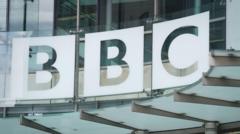In response to comments from Karoline Leavitt, the press secretary for the White House, the BBC firmly rejected allegations that it had taken down a story relating to the number of casualties in a recent shooting incident near an aid distribution site in Gaza. Leavitt's assertion described the BBC as relying on information from Hamas, which was labeled as "completely wrong" by the network.
The BBC clarified that it had updated its reporting with the evolving casualty figures, stemming from various sources, including medics and health officials. A spokesperson for the BBC stated, "We did not remove any story and we stand by our journalism,” emphasizing that it is customary to revise reporting in rapidly changing scenarios.
The confusion arose over conflicting reports about the events at the aid distribution center in Rafah, where witnesses alleged civilians were shot at while waiting for food. The Israeli military refuted these claims, insisting no shots were fired at civilians during the incident. Local officials, however, reported that Israeli forces opened fire, resulting in multiple fatalities.
The BBC also addressed criticism surrounding its reporting on a viral video linked to the aid distribution site. The outlet explained that findings from a Monday report determined the viral clip did not pertain to the event in question, further adding to the complexity of reporting in a region where direct access for journalists is severely restricted.
The BBC highlighted that international journalists are prohibited from entering Gaza, complicating their ability to verify events as they occur. They called on the White House for support in advocating for immediate access to the region for reporters.
The ongoing conflict, sparked by Hamas' cross-border attack in October 2023, has led to significant loss of life, with recent figures indicating that more than 54,000 people have died in Gaza since the onset of Israel's military campaign.
The BBC clarified that it had updated its reporting with the evolving casualty figures, stemming from various sources, including medics and health officials. A spokesperson for the BBC stated, "We did not remove any story and we stand by our journalism,” emphasizing that it is customary to revise reporting in rapidly changing scenarios.
The confusion arose over conflicting reports about the events at the aid distribution center in Rafah, where witnesses alleged civilians were shot at while waiting for food. The Israeli military refuted these claims, insisting no shots were fired at civilians during the incident. Local officials, however, reported that Israeli forces opened fire, resulting in multiple fatalities.
The BBC also addressed criticism surrounding its reporting on a viral video linked to the aid distribution site. The outlet explained that findings from a Monday report determined the viral clip did not pertain to the event in question, further adding to the complexity of reporting in a region where direct access for journalists is severely restricted.
The BBC highlighted that international journalists are prohibited from entering Gaza, complicating their ability to verify events as they occur. They called on the White House for support in advocating for immediate access to the region for reporters.
The ongoing conflict, sparked by Hamas' cross-border attack in October 2023, has led to significant loss of life, with recent figures indicating that more than 54,000 people have died in Gaza since the onset of Israel's military campaign.












